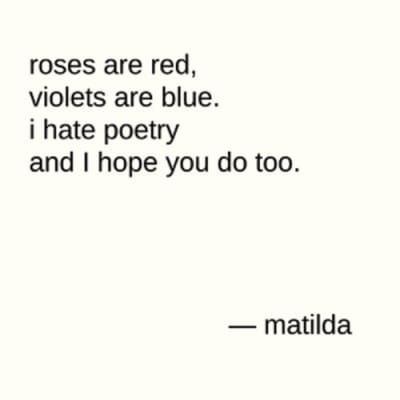“I HATE POETRY.”

Do you, fellow reader, read for fun? Do you enjoy going over the words of your favourite author at a speed of your choice, getting wholly immersed in a world that you do not physically inhabit? Do you feel touched by a piece of writing and feel that it has fundamentally changed you in some way?
All these feelings may disappear five minutes into an advanced English class requiring you to analyse, and (depending on which course it is) write poetry. Allow me to explain. Poems are fun, and sometimes easier to remember than most of the other texts you normally go through. They certainly require less time to read than novels and short stories. However, there comes a time when the thought of poems might make you want to curl up and hide under your bed.
You will know the feeling too, when the placement of a dash, comma, and colon have essays written on them, when you learn that splits between stanzas aren't splits but enjambments, and when a cup isn't a cup but a metaphor for human existence and alludes (don't you dare say "refers") to the idea of both an ancient philosopher and a philosopher who was alive even ten years ago. I have come across 11-page poems that have had people writing books critiquing the books critiquing the poems; I've come across shorter poems that require you to count the syllables in each of the line for you to understand what the poem is about. Teachers will tell you that you need to have knowledge of the Bible, the author's life and ideas, and the political scenario at the time the poem was written.
It only gets worse. You don't just have to read and re-read poems, you have to sound it out so you get a sense of the rhythm—see if it's cacophonous or harmonious. Think similes, metaphors and alliteration is enough? Think again. Here comes assonances, consonances, metonymies, synecdoche, dactyls, and the iambic pentameter. Rhyming doesn't just happen at the end of a line anymore: introducing "internal rhyme". You further learn that there is something called an iamb, and it consists of an unstressed syllable followed by a stressed one, and the opposite of an iamb is for some reason called a trochee instead of a reverse iamb.
Now you may think that maybe somewhere deep down I really do enjoy poetry, and you wouldn't be wrong. But then you come across lines like "I have measured out my life with coffee spoons" and you realise that that this is you with your inane existence.
I can go on. But I'll just leave you with one of my own poems.

 For all latest news, follow The Daily Star's Google News channel.
For all latest news, follow The Daily Star's Google News channel. 



Comments